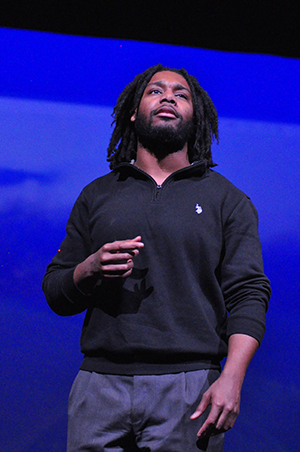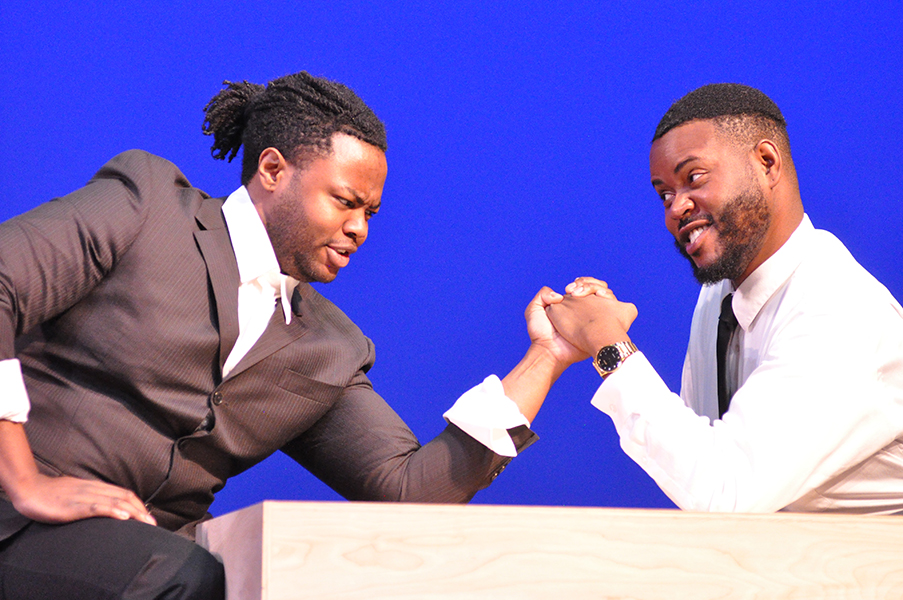“The Meeting” is a moving and thoughtful play written by Jeff Stetson, about a fictionalized encounter between two iconic Civil Rights Movement figures, Malcolm X and Dr. Martin Luther King Jr. The play explores the two giants differing ideologies, tactics and visions for achieving racial equality in America.
The entire encounter takes place in a Harlem hotel room in 1965 as the two leaders delve deeper into their personal convictions, strategies and the complexities of their roles in the struggle for civil rights.
The play will be featured at the Mitby Theater on Madison College’s Truax Campus on Feb. 10 with showings at 2 p.m. and 7 p.m.
I had the honor of interviewing the former host of All Things Considered at WUWM and current Director of the production “The Meeting,” Denzel Taylor.

Q: What inspired you to depict a meeting between two social justice giants with such differing views on how to go towards their shared goal of equity?
A: This play is undeniably impactful, sure to ignite discussion and debate. Reflecting on personal experiences, including lessons from my mother about Dr. King and the Civil Rights era, my time at a PWI (predominantly white institution) in college, and recent events like George Floyd and Black Lives Matter, it became evident that this play delves into the philosophies of two pivotal figures in American history, still relevant today.
Being chosen to bring this discussion to life filled me with pride, and the positive reception fueled my desire to do it justice once more. I aim to honor Dr. King, Malcolm X, and the era while inspiring audiences towards a brighter future.
Q: How do you want viewers to interpret the dynamic between Malcolm X and Dr. Martin Luther King, Jr. in the play?
A: Experiencing this production, I want viewers to see that these men, while opposed in their approach, still are grappling with the complexities of their values and are similar in their drive. Playwright Jeff Stetson beautifully created this sense of camaraderie, even though the characters’ rhetorical battle. It’s both ironic and riveting and I am excited to realize this vision further.
Q: Are there specific themes or messages you aimed to highlight throughout the play?
A: While I can’t reveal too much, I aim to spotlight the mission and personal histories of figures like Dr. King and Malcolm X. What’s striking is that they didn’t see themselves as extraordinary individuals, but rather saw greatness in their mission. This distinction challenges common perceptions, especially regarding Dr. King, who is often idolized. In reality, both Dr. King and Malcolm X were ordinary individuals with their own struggles, striving to serve their cause of black liberation and America’s freedom.
Q: How did you approach the characterization of Malcolm X and Dr. Martin Luther King, Jr. within the play? What challenges did you face in your attempt at bringing these iconic figures to life on stage?
A: I constantly advise my actors to embrace the highs and lows, finding the peaks and valleys in their performances. Each character has their moment to shine and contribute to the overall ambiance. It’s essential to avoid pigeonholing characters like Dr. King or Malcolm X into one-dimensional roles; instead, I strive to portray the full breadth of their humanity, ensuring authenticity and depth in their portrayal.
Q: Did you make any intentional connections between the historical context of the play and current social issues? In what ways do you believe the themes and debates presented in “The Meeting” are still relevant to contemporary society?
A: The play’s historical context resonates deeply with our current social and political landscape. Through carefully crafted design elements such as ambient sounds, audio clips, and lighting, we aimed to amplify these connections and enhance the impact of the dialogue. Jeff Stetson’s foresight in writing this play feels almost prophetic, and I believe many in the audience will recognize this. The themes prompt questions about our actions, effectiveness, and future, echoing concerns shared by many today.
Q: What do you hope the audience takes away from watching “The Meeting”?
A: The work continues; Dr. King, Malcolm X, and other Civil Rights leaders are invaluable sources of inspiration. By remembering, discussing, and learning from them, we can move forward. They were human, like us, showing that even small actions can make a difference.
Q: Have there been any notable reactions or discussions that you’ve seen or heard from prior audiences that stood out to you?
A: Audiences enjoy this play; they get excited talking about the history and records and debating the nuances and what ifs and questions of “what can we do now?” That’s what I’ve noticed.
Q: What were the most challenging aspects of directing “The Meeting”?
A: Directing and starting a theater company comes with their challenges, especially in organizing multiple moving parts. However, with a collaborative team like Nobleman, I embrace these challenges to the best of my ability.
Q: On the flip side, what were the most rewarding moments in the production process? Finally: How has directing “The Meeting” influenced your approach to other projects?
A: Directing “The Meeting” presented logistical challenges, yet our team’s collaborative spirit propelled us forward. The community’s encouragement affirmed the theater’s power to inspire change. “The Meeting” has renewed my artistic purpose, emphasizing storytelling’s transformative potential. In closing, it stands as a testament to theater’s ability to illuminate history and inspire action.


























